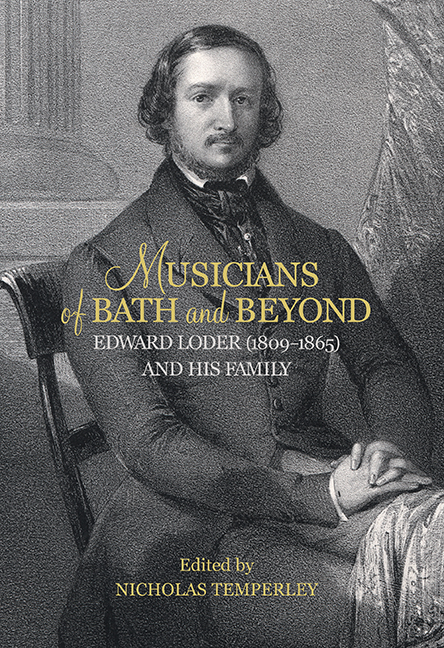Book contents
- Frontmatter
- Contents
- List of Illustrations
- Acknowledgments
- Notes on Contributors
- The Loder Family Tree
- Abbreviations
- Introduction
- PART ONE The Musical Profession in Early Nineteenth-Century England
- PART TWO The Loder Family
- PART THREE The Music of Edward Loder
- EPILOGUE The 1966 Revival of Raymond and Agnes
- Select Bibliography
- Index of Edward Loder’s compositions
- General Index
- Miscellaneous Endmatter
6 - A Master Violinist and Teacher: John David Loder (1788–1846)
Published online by Cambridge University Press: 04 June 2021
- Frontmatter
- Contents
- List of Illustrations
- Acknowledgments
- Notes on Contributors
- The Loder Family Tree
- Abbreviations
- Introduction
- PART ONE The Musical Profession in Early Nineteenth-Century England
- PART TWO The Loder Family
- PART THREE The Music of Edward Loder
- EPILOGUE The 1966 Revival of Raymond and Agnes
- Select Bibliography
- Index of Edward Loder’s compositions
- General Index
- Miscellaneous Endmatter
Summary
These are merely the chest of tools – it is the master who must direct the employment of them.
THE biography of J. D. Loder (1788–1846) is already relatively familiar or readily available to those interested in nineteenth-century British music, and other contributors to this volume have provided valuable further details and insights. Therefore it should be sufficient merely to remind ourselves briefly of the orphaned child prodigy, son of a Bath-based violinist, who became hugely celebrated as a violinist and leader in his home city; became the first Englishman to lead the orchestra of the Philharmonic Society of London; established himself as a music publisher in Bath; became a professor of violin at the RAM; succeeded Franz Cramer as leader of the Ancient Concerts; played viola in Dando's Quartet Concerts; wrote important pedagogical texts for the violin published into the twentieth century; and was the father of the twins John Fawcett Loder, who also became prominent in Bath and London as a violinist, teacher and concert manager, and the composer Edward James Loder.
John David Loder was engaged in activities at the highest professional level and represents a very rare breed: a native instrumentalist with a superb pedigree as both a performer and pedagogue. Reaching this level as a violinist is even more noteworthy. He managed to achieve a status and legacy beyond his own lifetime, an achievement reserved in Britain, as a rule, for prominent foreign figures. The circumstances of his success and rise to prominence provide a unique case study within the complex fabric of British music and instrumental performance and pedagogy in the nineteenth century.
❧ An English Musician of Eminence
The brief synopsis of John David's life given above would certainly support the assertion that Loder achieved a position of eminence during his lifetime. Taking a broad perspective, British violinists, like most of their instrumentalist colleagues, had long struggled to compete with the more exotic and often more competent foreign masters. Even relatively prominent players were not qualified to stand alongside and compete, as leaders and soloists, with the likes of Giardini, W. Cramer, Barthélemon and Salomon. Happily, the nineteenth century brought some improvement in the achievements and fortunes of native violinists, following the emergence of more enlightened attitudes and greater opportunities.
- Type
- Chapter
- Information
- Publisher: Boydell & BrewerPrint publication year: 2016

